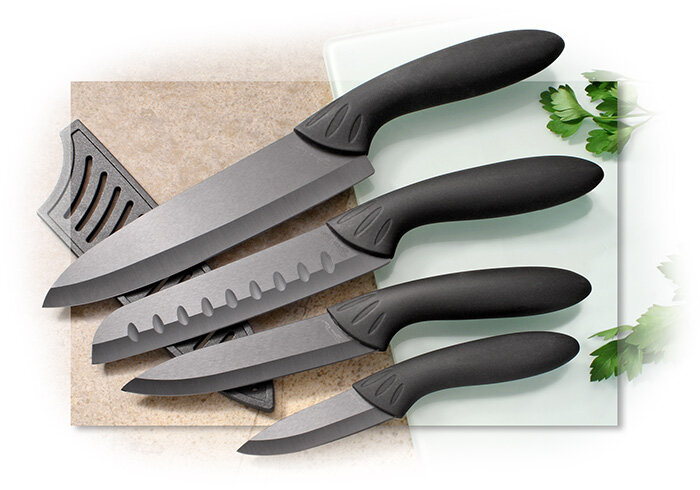5 Things You Need to Know About Ceramic Knives
If you’re thinking about buying a new knife, you may have considered a ceramic knife. They’re the popular knife on (or rather in) the block — and with good reason. They’re affordable, lightweight, and very, very sharp.
But is a ceramic knife the right knife for you? If you’re looking for an all-purpose tool, the answer is probably not. If, on the other hand, you’re looking to supplement your knife roll with a wear-resistant blade that can slice and dice with precision, a ceramic knife may be a solid investment. Read on to find out what you need to know before you buy.
1. Yes, they’re really made of ceramic.
But this isn’t the same ceramic that’s used to make your coffee mug. The most common ceramic for knives is zirconium oxide, also known as zirconia. It’s very hard — significantly harder than stainless steel or carbon steel. It won’t rust, and it doesn’t absorb smells.
2. They’re super sharp.
They may look and feel like fancy plastic cutlery, but ceramic knives are super sharp. They also stay sharp for a long time — and, notes Eivin Kilcher, cookbook author and co-star of Discovery’s Alaska: The Last Frontier, “if you take good care of them, you could have them for quite a while.”
On the other hand, when they do dull, they’re a bit tricky.
(We recommend using our knife sharpeners) More Info
3. They’re featherweight.
It’s really noticeable how lightweight ceramic knives are when compared to their steel counterparts. The average ceramic knife is about half the weight of a steel blade. This makes them very easy to handle, but ultralight isn’t always ideal. Cara Mangini, author of The Vegetable Butcher, says ceramic knives aren’t heavy enough: “They may seem so easy to use at first, but when you work with a lot of vegetables, eventually your hand and arm will end up doing most of the work if your knife is too light.”
4. They’re brittle.
The hardness that makes ceramic knives incredibly sharp and resistant to wear also makes them susceptible to chipping or breaking. “They have a tendency of being really fragile,” says Kilcher. “I think they’re really cool — I’ve used a few of them — but I probably shouldn’t own one. I would be worried about chipping the blade.”
Taylor Erkkinen, co-founder of Brooklyn Kitchen, advises steering clear of anything with pits, seeds, or bones. And if you drop your ceramic knife, you’re probably going to need a new blade.
5. They’re not a replacement for a chef’s knife.
“A ceramic knife should not and will not replace a chef’s knife,” says Erkkinen. “They’re great for certain things. Nothing cuts through cold butter like a ceramic knife — it’s like cutting through hot butter.” Hiroshi Shima, executive sushi chef at Sushi Roku in Los Angeles, CA, adds, “They are great for bartenders.”
So, should you get a ceramic knife? If you’re doing a lot of precision work with fruits and vegetables, the answer may be yes. Ditto if you’re tapping into your inner Mary Berry or planning to perfect your citrus twist. But if you’re looking for an all-purpose knife, ceramic probably isn’t the way to go.

